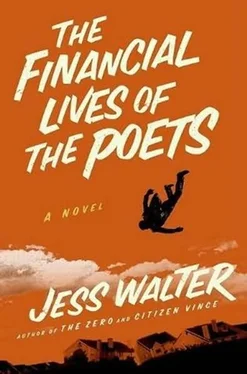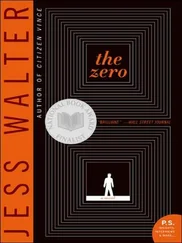I push away from the computer, spend ten minutes in mortgage-company automated-phone hell (por español, dos) but my heart’s just not in it. I need to sell some jack. I do push-ups. Sit-ups. Shower. Take a dress shirt from the ignored side of my closet, whisper to the despondent ties: stay alert boys, any day now, any day! Downstairs, Dad has given up ever finding Jim Rockford on TV and is watching news swing back and forth from a plane crash to the recession and back again, until they begin to seem like the same thing. “Look at that,” Dad says of a certain twenty-four-hour news babe. “I’d like to bend her over her anchor desk.”
As my father fantasizes rough sex with this pert professional on her crisp news set, I run a comb through his wispy gray hair. He pats his chest for a cigarette.
Dad follows me to the car, where he rides like a vet-bound dog, facing sideways, the world streaming past like the façade of an old arcade game. There is a for-sale sign in the back passenger seat window of my car. Such new details are always alarming to Dad-they must signify something-so every once in a while he looks back at the sign. “You selling this car?”
“Yeah.”
“What kind of car is this?”
“Maxima.”
He sighs. “Do you know what I miss?”
“Dan Fouts?”
“Chipped beef.”
“I know you do, Dad.” The sky is clear again today, world
sharply drawn, trees clear of leaves, their anguished branches rising like clutched fingers. It’s quiet in the car. He first had it in the Army; shit-on-a-shingle, they called it. My mom used to make it for him, too. She preferred the description “chipped beef”-which, now that I think about it, is what he says he misses, not shit-on-a-shingle. Huh. So, he misses Mom’s chipped beef. Maybe he misses Mom.
“Dad, what do you say we have that for lunch today?”
“Have what?”
“Chipped beef.”
“I miss that.”
“Yeah. Me, too.”
He looks back. “You selling this car?”
“Yeah.”
“What-”
“Maxima.”
He is not happy in the doctor’s office waiting room. For the dementia patient, all of life is a waiting room in which you can’t remember what you’re waiting for and your turn never comes. In this actual waiting room are the kinds of people my father would never choose to spend his morning with-whiners, sniffers, the weak, complainers. I think about asking a nurse for something to help me sleep; I got an hour or two last night but I suppose you can’t really complain about not sleeping if you’re not actually going to bed.
The nurse calls Dad’s name and he looks at me. I nod and we start to the back of the clinic. She takes his blood pressure and weighs him. He’s lost six pounds in six months. She glances over at me. I know. I know. I’m not feeding him enough chipped beef.
We sit in the doctor’s office. Dad shifts, crinkles the paper-covered table. He stares at a crosscut drawing of the female repro
ductive parts, trying to figure out what he’s looking at: some kind of plant? map of the Gaza Strip? carburetor? Finally, I think his mind gets around what it is, and he winces and looks away.
Dad’s doctor always seems grumpy about our appearance, even though she schedules these routine appointments. I always feel guilty that we’ve taken time away from her important life-saving for a routine maintenance check on Dad’s failing mind. She spends a few minutes on his health; she’s glad he’s quit smoking, even though I fear he’s just forgotten it.
“Okay, Jerry,” she says. “I’m going to ask you a few questions. What year is this?”
My father looks at me, pissed that I’ve done this to him. Last time he guessed 1997.
“Nineteen…” He rubs his dry lips. “No.” And he smiles, because he’s not falling for the trap this time. “One thousand eight.”
“One thousand eight?”
“Yes,” he says.
“And the month?”
“November.”
“So it’s November of one thousand eight?”
“If you say so.” He smiles at me. One thousand eight? Maybe it’s not terrorists we have to fear, the dudes planning another 7/11. Maybe we should be more worried about the Norman invasion. Or the plague.
“Where did you work, Jerry?”
“I worked at the…place.” He looks at me. “Sears,” he says, relieved.
“And what did you do?”
He pats himself for a missing smoke. Then he looks at me again. After managing the automotive department at Sears, Dad
worked briefly in the Sears insurance offices but I think he missed his coveralls. He says, “What did I do? Hell, I did my job, that’s what.”
“I’ll bet you did. And what did you have for breakfast today, Jerry?”
He looks from the doctor to me. Blank. I can’t help him. He is pissed. If this test is the SATs of senility, Dad is headed straight for the Yale of assisted living places. “I have to go to the bathroom,” he tells the doctor.
While he’s gone the doctor looks at his chart. “He’s lost six pounds.”
“He’s eating,” I say.
“Does he have any favorite foods you can make?”
“Shit-on-a-shingle?”
Maybe Lisa is right and I do have an inappropriate sense of comic timing; or maybe some people just don’t laugh when they should, this doctor, for instance, who looks down at the chart.
“He comes in and out, has good days and bad days,” I say, which is pretty much the outlook the doctor predicted six months ago.
“More bad days, though? More days like today.”
“Not really,” I lie. “Half and half.”
“Have you talked with your father any more about assisted living?”
“A little,” I say. “He’s had some financial trouble…we’re sorting out his insurance now. But honestly…I think he’d rather eat a gun than go live in one of those death warehouses.”
I’m not sure why I’m doing this-shit-on-a-shingle and eat a gun and death warehouses…as if the rough drug dealer is already emerging. Maybe I’ll whack this doctor.
Dad comes back in the room. “Two thousand eight,” he tells the doctor. “I think I said it wrong before.” I recall the calendar at
the nurse’s station. Dad glances over at me, and smiles, and I don’t think I’ve ever loved the old guy more than I do right now.
He drifts in and out like this during the remainder of the test, knows some things I wouldn’t guess he’d know but can’t come up with others that seem basic to me, like two of my three sisters’ names. Simple math crushes him, and when he’s asked to repeat a list-wallet, telephone, car keys-thirty seconds later, he’s angry about the trick question. “What list?”
“I said to repeat those three things,” the doctor said. “Remember?”
“Well, they must have been stupid things,” Dad says. Right again.
I drive Dad home and put the TV on financial news, slip into a sports coat and drive back downtown for my meeting with Earl Ruscom. I park ten blocks away to avoid paying for a meter. I’ll buy nine thousand dollars worth of pot, but I won’t pay fifty cents to park.
Outside the restaurant, I call Dave the Drug Dealer to put in my order. He asks if I’ve read the menu. I say I have and that I’m interested in Arrow Lakes PB. I’m careful not to say how much.
“Good choice,” Dave says. “Very good for glaucoma. Let me get back to you.”
He hangs up and I go inside.
I first met Earl Ruscom in 1997, at a public hearing I covered as a reporter. Earl was there to get the county to waive environmental cleanup for a cluster of houses he wanted to put on the site of an old railroad depot. Somehow, Earl got it in his mind that I was on his side in this dispute, because while my stories described him accurately as a voracious fat-ass developer trying to get around reasonable environmental laws, in the profile I called him “bombastic” and Earl took this as a compliment. “Just glad to have you on my side, Matt,” he used to say, even though I explained that reporters
Читать дальше










